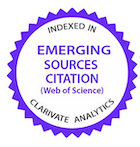Prevalência de Escherichia coli produtora de shiga toxinas isolada de carne moída e leite cru no Sul do Brasil
Palavras-chave:
Shiga toxin-producing Escherichia coli, ground beef, milk, acid, ethanolResumo
O trabalho teve como objetivo determinar a ocorrência de Escherichia coli produtora de toxina Shiga (STEC) em carne moída e leite cru no sul do Brasil e estudar o comportamento de STEC isoladas de fezes de bovinos de corte e leite, verificando sua resistência em meios ácido e alcoólico. Não foram identificados genes stx1 e stx2 nas 464 E. coli isoladas de carne moída e leite cru. STEC isoladas de fezes de bovinos mantiveram populações estáveis e apresentaram crescimento, respectivamente, em carne moída e em leite experimentalmente contaminados, durante 120 horas a 8ºC. Esses isolados foram inativados quando expostos a pH 2,5 e 3,0, mas permaneceram viáveis após oito horas em pH 4,0. Os isolados de STEC não sobreviveram 48 horas em meio contendo 12% de etanol. Em 6% de etanol, STEC O174:H21, O163:H19 e O112:H2 apresentaram crescimento, ao passo que STEC O91:H21 e O22:H8 não resistiram além de 24 e 48 horas de incubação, respectivamente. A baixa prevalência de STEC em alimentos e as características das cepas encontradas em bovinos podem estar relacionadas com a baixa prevalência de enfermidades de origem alimentar causadas por STEC no Brasil.PALAVRAS-CHAVES: Ácido, carne moída, etanol, leite, Escherichia coli produtora de toxina Shiga.
Downloads
Não há dados estatísticos.
Downloads
Publicado
2009-07-03
Como Citar
TIMM, Cláudio Dias; CONCEIÇÃO, Fabrício Rochedo; MENIN, Angelo; CONCEIÇÃO, Rita Santos; DELLAGOSTIN, Odir; ALEIXO, José Guimarães. Prevalência de Escherichia coli produtora de shiga toxinas isolada de carne moída e leite cru no Sul do Brasil. Ciência Animal Brasileira / Brazilian Animal Science, Goiânia, v. 10, n. 2, p. 641–649, 2009. Disponível em: https://revistas.ufg.br/vet/article/view/4008. Acesso em: 11 fev. 2026.
Edição
Seção
Medicina Veterinária
Licença
Copyright (c) 2009 Ciência Animal Brasileira / Brazilian Animal Science

Este trabalho está licenciado sob uma licença Creative Commons Attribution 4.0 International License.
Autores que publicam nesta revista concordam com os seguintes termos:
- Autores mantém os direitos autorais e concedem à revista o direito de primeira publicação, com o trabalho simultaneamente licenciado sob a Licença Creative Commons Attribution que permite o compartilhamento do trabalho com reconhecimento da autoria e publicação inicial nesta revista.
- Autores têm autorização para assumir contratos adicionais separadamente, para distribuição não-exclusiva da versão do trabalho publicada nesta revista (ex.: publicar em repositório institucional ou como capítulo de livro), com reconhecimento de autoria e publicação inicial nesta revista.
- Autores têm permissão e são estimulados a publicar e distribuir seu trabalho online (ex.: em repositórios institucionais ou na sua página pessoal) a qualquer ponto antes ou durante o processo editorial, já que isso pode gerar alterações produtivas, bem como aumentar o impacto e a citação do trabalho publicado (Veja O Efeito do Acesso Livre).


























